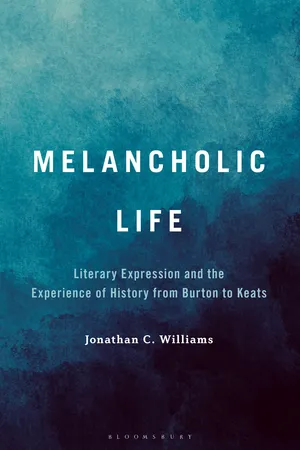
eBook - ePub
Melancholic Life
Literary Expression and the Experience of History from Burton to Keats
- English
- ePUB (mobile friendly)
- Available on iOS & Android
eBook - ePub
Melancholic Life
Literary Expression and the Experience of History from Burton to Keats
About this book
A study of how 18th-century British literary writers deployed melancholic feeling to draw a complex web of relations between the embodied self and its historical present.
Melancholic Life argues that what binds 18th-century melancholics such as the speaker of James Thomson, Sarah Fielding's David Simple, or William Cowper is a belief that critical thought is worth voicing whether or not it contributes to social change. That belief converges with 18th-century ideas of sentiment and loneliness, but it also syncs up in surprising ways with theoretical models of political subjectivity that emerge in the 20th and 21st centuries.
Jonathan C. Williams thus proposes a new way of thinking about the critical importance of literary melancholy in the 18th century: as the language of melancholic social criticism, a solitary protest against exploitative features of social life, including global commerce and print capitalism. That form of melancholic life helps to trace a genealogy from Robert Burton's Democritus to Defoe's Crusoe to the Romantic period; it also yokes the early capitalist historical moment of Mackenzie's The Man of Feeling to the post-1968 modernity that characterizes the work of Theodor W. Adorno.
As Melancholic Life shows, melancholic social criticism persists even when there is little hope. That spirit of persistence becomes a condition of literary expression in the 18th century. Attention to melancholic expression reveals resonances not only to medical, religious, poetic, and philosophical language, but also between 18th-century thinkers and your own historical moment.
Melancholic Life argues that what binds 18th-century melancholics such as the speaker of James Thomson, Sarah Fielding's David Simple, or William Cowper is a belief that critical thought is worth voicing whether or not it contributes to social change. That belief converges with 18th-century ideas of sentiment and loneliness, but it also syncs up in surprising ways with theoretical models of political subjectivity that emerge in the 20th and 21st centuries.
Jonathan C. Williams thus proposes a new way of thinking about the critical importance of literary melancholy in the 18th century: as the language of melancholic social criticism, a solitary protest against exploitative features of social life, including global commerce and print capitalism. That form of melancholic life helps to trace a genealogy from Robert Burton's Democritus to Defoe's Crusoe to the Romantic period; it also yokes the early capitalist historical moment of Mackenzie's The Man of Feeling to the post-1968 modernity that characterizes the work of Theodor W. Adorno.
As Melancholic Life shows, melancholic social criticism persists even when there is little hope. That spirit of persistence becomes a condition of literary expression in the 18th century. Attention to melancholic expression reveals resonances not only to medical, religious, poetic, and philosophical language, but also between 18th-century thinkers and your own historical moment.
Frequently asked questions
Yes, you can cancel anytime from the Subscription tab in your account settings on the Perlego website. Your subscription will stay active until the end of your current billing period. Learn how to cancel your subscription.
No, books cannot be downloaded as external files, such as PDFs, for use outside of Perlego. However, you can download books within the Perlego app for offline reading on mobile or tablet. Learn more here.
Perlego offers two plans: Essential and Complete
- Essential is ideal for learners and professionals who enjoy exploring a wide range of subjects. Access the Essential Library with 800,000+ trusted titles and best-sellers across business, personal growth, and the humanities. Includes unlimited reading time and Standard Read Aloud voice.
- Complete: Perfect for advanced learners and researchers needing full, unrestricted access. Unlock 1.4M+ books across hundreds of subjects, including academic and specialized titles. The Complete Plan also includes advanced features like Premium Read Aloud and Research Assistant.
We are an online textbook subscription service, where you can get access to an entire online library for less than the price of a single book per month. With over 1 million books across 1000+ topics, we’ve got you covered! Learn more here.
Look out for the read-aloud symbol on your next book to see if you can listen to it. The read-aloud tool reads text aloud for you, highlighting the text as it is being read. You can pause it, speed it up and slow it down. Learn more here.
Yes! You can use the Perlego app on both iOS or Android devices to read anytime, anywhere — even offline. Perfect for commutes or when you’re on the go.
Please note we cannot support devices running on iOS 13 and Android 7 or earlier. Learn more about using the app.
Please note we cannot support devices running on iOS 13 and Android 7 or earlier. Learn more about using the app.
Yes, you can access Melancholic Life by Jonathan C. Williams in PDF and/or ePUB format, as well as other popular books in Literature & Gothic, Romance, & Horror Literary Criticism. We have over one million books available in our catalogue for you to explore.
Information
Table of contents
- Cover
- Half-Title
- Title
- Contents
- Introduction
- 1 Melancholic Feeling from Aristotle to Sentimentalism
- 2 Crusoe’s Fever
- 3 Reverie’s Futures
- 4 Melancholic Books: Johnson and Leapor
- 5 Cowper Anatomized
- 6 Saturnine Keats
- Acknowledgments
- Bibliography
- Index
- Copyright